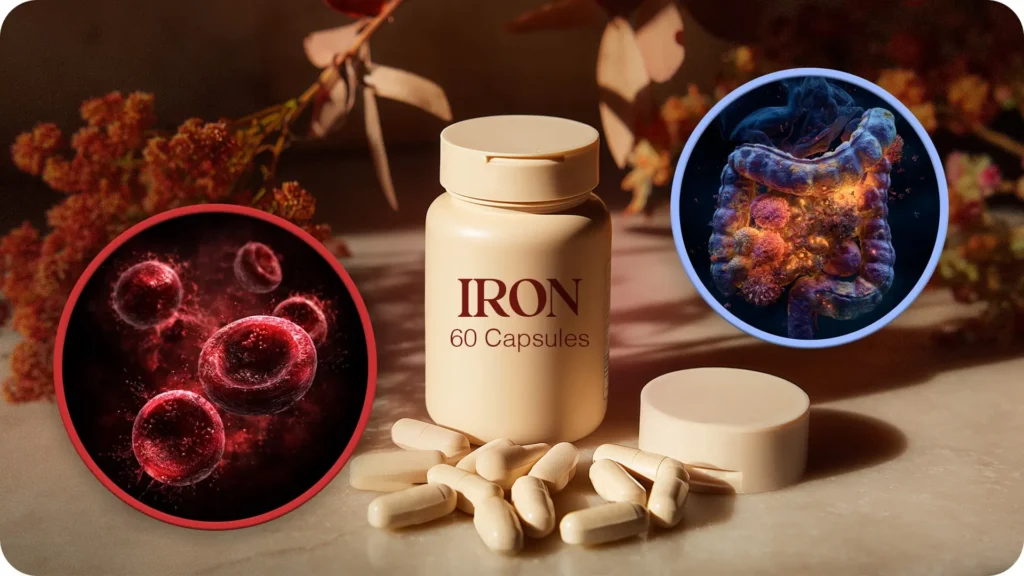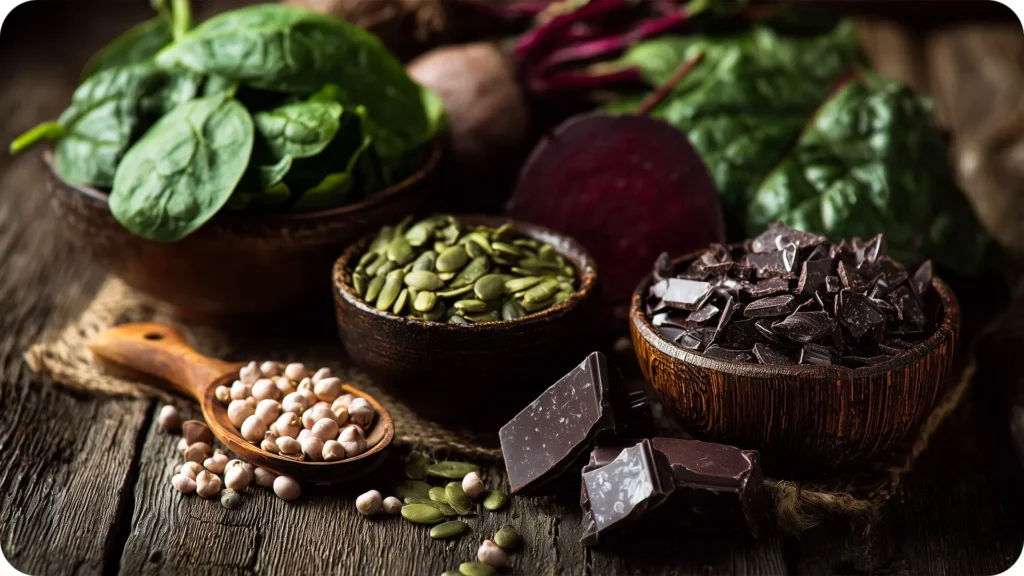
Have you ever felt constantly tired, foggy, or just not quite right, and someone suggested you might be low in iron?
Low iron and anemia are very common problems nowadays.
To address this, oftentimes people simply decide to buy an iron supplement and hope for the best.
What most people don’t realize is that iron supplementation might be quietly doing more harm than good. In fact, it’s most likely accelerating your body’s aging process.
But don’t worry, because there are excellent alternatives. Today, you will find out the truth behind iron supplements and how to receive all the benefits without the downsides.
The Hidden Danger of Synthetic Iron Supplements
You probably already know that iron is essential for the body. It helps your body carry oxygen, build DNA, and stay energized. But when you receive too much, and especially in the wrong form, it can be toxic.
That’s the problem with most iron supplements. They go by the name of non-heme iron, which is usually made from synthetic compounds like ferrous sulfate or ferrous gluconate.

Here are the main issues this synthetic iron can cause:
- It can upset your gut.
Many people experience nausea, constipation, bloating, and stomach cramps. This is because synthetic iron is harsh on the digestive tract. It isn’t always well absorbed, so it lingers, irritates the gut lining, which can throw off your natural balance of bacteria. - It fuels oxidative stress.
Consider what happens when metal rusts; it becomes weak, flaky, and breaks down. And what happens inside your cells is quite similar. When iron builds up in the body, it can act like a catalyst, triggering corrosive reactions that slowly damage tissue. - It creates harmful free radicals.
When synthetic iron combines with substances like vitamin C or hydrogen peroxide (which your immune system naturally produces), it triggers a chain reaction. This reaction generates free radicals, which are tiny, unstable molecules that rip through cells, damage DNA, and disrupt your mitochondria. Over time, this causes the cells to age faster. - It’s linked to chronic disease.
Research has linked excess iron to a higher risk of Alzheimer’s, Parkinson’s, heart disease, and even certain cancers.
And what’s worse is that the body has no easy way to get rid of excess iron. Once it’s there, it stays for a long time and can build up over time.
PD Mangan, a health researcher and advocate for science-based aging strategies, says:
“Iron in the natural world reacts with oxygen and rusts. Inside the body, it essentially does the same thing, causing high levels of oxidative stress.”
Natural Iron: A Safer, Smarter Way
While there are hazards associated with artificial supplements, we can’t deny that iron remains essential.
So what’s the solution?
Real iron, from natural sources.
Natural iron, such as that found in whole foods, comes with built-in co-nutrients that aid absorption and reduce stress on the body. These include vitamin C, antioxidants, and fiber.
Why does that matter?
Because your body is designed to intake real food, it absorbs what it needs and lets the rest go. As a result, there’s no overload and no rusting from the inside out.
In fact, a 2016 study found that iron from natural sources is much less likely to cause oxidative stress than synthetic forms. Additionally, natural sources often offer benefits such as anti-inflammatory properties and improved gut health.
How to Boost Iron the Right Way

Here is a list of natural sources with the highest iron content:
- Leafy greens (like spinach and kale)
- Legumes (lentils, chickpeas, black beans)
- Beets and beetroot
- Pumpkin seeds
- Seafood, specifically fish, not shellfish (If on the Budwig Diet, avoid consuming fish often).
- 100% Organic dark chocolate (or pure cacao beans)
Try Liquid Chlorophyll
While chlorophyll itself doesn’t contain iron, its structure resembles hemoglobin. In addition, chlorophyll has been shown to support the health of red blood cells.
The Bottom Line
Aging is natural. However, there are ways to slow down this process.
For example, swapping synthetic supplements for natural, food-based sources of iron.
Additionally, avoid ferrous sulfate or other similar forms. Also, avoid combining iron pills with vitamin C, as this can increase oxidative stress.
By doing this, you will protect your cells, boost energy, help build a strong immune system and improve long-term health.
When you do decide to take a supplement, it’s important to choose good-quality supplements that will work with your health rather than against it.
For that, we recommend our own select set of great-quality supplements that almost anyone can benefit from, available in our shop.
Sources
- NHS. (n.d.). Side effects of ferrous sulfate.
- Chen, X., Zhang, Y., Zhu, X., & Fan, Y. (2019). Iron homeostasis and iron-regulated reactive oxygen species in cell death. Pharmacological Research, 139, 146–156.
- Lukaski, H. C. (2005). Low dietary iron increases oxidative stress in the gut. Nutrition Journal, 3, 2.
- Life Extension. (2012). Excess iron and brain degeneration.
- Kohgo, Y., Ikuta, K., Ohtake, T., Torimoto, Y., & Kato, J. (2008). Body iron metabolism and pathophysiology of iron overload. International Journal of Hematology, 88(1), 7–15.
- Mangan, P. D. (n.d.). Iron accelerates aging.
- Skibsted, L. H., & Jøker Bysted, A. (2016). Iron absorption and bioavailability from food and supplements. Food Science and Biotechnology, 25, 1205–1213.
- Real Simple Editors. (2023). 9 Foods High in Iron.
- Quirky Science. (n.d.). Comparing Hemoglobin and Chlorophyll.